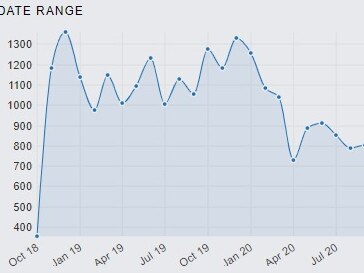Crime precursors more common but their effects remain hidden
Toowoomba’s official crime rate is down about 30 per cent but that does not mean our city is safer. One leading criminologist said the COVID-19 pandemic pushed crime in doors, where it is harder to detect.
Police & Courts
Don't miss out on the headlines from Police & Courts. Followed categories will be added to My News.
Official police statistics point to a sustained drop in Toowoomba’s crime rate but there are concerns the figures overlook a spike offending behind closed doors, in homes across the city.
“Police cannot tell us what has not been reported or what has not been detected,” University of Southern Queensland criminologist Suzanne Reich said.
“We call that the dark figure of crime.
“There is more than what is reported, but how much we can never know.”
Offending is down across the city by 20-30 per cent compared to the same time last year.
About 1148 offences were recorded in March 2019 compared to just 732 in March 2020.
June 2019 had 1232 offences recorded compared with 913 a year later.
Police processed 1054 offences in the September 2019 but as few as 803 in 2019.
The largest drop was in unlawful entry and burglary offences, theft, fraud, public drunkenness and traffic offences.

Rather than rely on police statistics, Dr Reich looked at the rate of people contacting support services.
There were worrying changes in behaviour during the COVID-19 pandemic that point to an increase in what she said were ‘private domain offences.’
They included more financial stress, unemployment, housing stress, spikes in the number of people gambling online, viewing internet pornography, and buying illicit or stolen products on the dark web.

Dr Reich said isolation was key factor, including the amount of time people in abusive relationships spent locked down together.
A recent study from the Australian Institute of Criminology surveyed 15,000 Australia women and found 8.8 per cent of women experienced actual or threatened physical violence in the first three months of the COVID-19 pandemic.
It found two-thirds of women who experienced physical or sexual violence said either that it was the first time their partner had been violent, or that the violence was getting worse.
“Contact between victims and domestic violence services has increased in that time,” Dr Reich said.
“It is quite possible that the reason the police are not getting these reports is because the victims are at home with their abusers and it could trigger move violence if they make a formal report to the police.”
A similar study by the AIC found online gambling was on the rise.
It surveyed 1000 adults in May and found 26 per cent were gambling more on sport, 18.7 per cent gambled more on online card games while online pokie gambling was up 19.6 per cent.
Dr Reich said how this increased punting would affect the crime rate remained to be seen.
“If later on it turns into a full-blown addiction, than that has a knock-on effect for financial stress,” she said
“We know that it has an effect on other problematic behaviours, like domestic violence or drinking and engaging in violent activities.”



